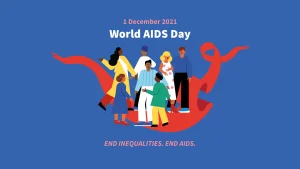 As we near the end of a second year of the COVID-19 pandemic, we would like to take a moment to reflect on another devastating pandemic that began in the early 1980s. According to UNAIDS, “78 million people have become infected with HIV and 35 million have died from AIDS-related illnesses” since scientists and medical personnel were first alerted to a new, mysterious, and highly deadly virus. To put the level of loss into a perspective that we now can all understand, it is like having a COVID-19 pandemic that lasts for 40 years.
As we near the end of a second year of the COVID-19 pandemic, we would like to take a moment to reflect on another devastating pandemic that began in the early 1980s. According to UNAIDS, “78 million people have become infected with HIV and 35 million have died from AIDS-related illnesses” since scientists and medical personnel were first alerted to a new, mysterious, and highly deadly virus. To put the level of loss into a perspective that we now can all understand, it is like having a COVID-19 pandemic that lasts for 40 years.
Unfortunately, the history of AIDS in the United States is inextricably linked to homophobia. Labeled as a “gay disease” for the first several years, thousands of lives were lost, due to inaction and from political and medical systems. It wasn’t until famed actor Rock Hudson died of AIDS in 1985 that significant attention was finally given to the crisis. Hudson, viewed by fans as the embodiment of heterosexual masculinity, had many secret same-sex relationships. The fact that he, and those around him, felt compelled to hide this, illustrates the lack of identity safety that so many homosexuals felt at that time.
Like Hudson, many gay men battled this devastating disease in secret. They also dealt with the refusal of some medical professionals to provide care for them, and frequent public outcries that AIDS was sent to purge the world of homosexuals. As someone who identifies as gay, I cannot imagine the fear and isolation these individuals must have felt. Additionally, I cannot imagine the anger that likely circled through their communities when it took a “normal” person’s death to spur momentum to understand and treat the HIV virus.
Thankfully, scientific advancements have transformed HIV/AIDS from a death sentence to a manageable condition, so long as there is equitable access to treatment. Equally, I celebrate the progress we have made to create more inclusive spaces for the LGBTQ+ community. While there is still more work to be done on both the scientific and cultural levels, we now see things like HIV/AIDS status being listed in anti-discrimination policies. With the 2015 passage of marriage equality, many same-sex couples gained access to healthcare benefits that were previously denied to them. These improvements create belonging for people who have a long history of being marginalized.
The HIV virus did not recognize, nor did it care about someone’s sexual orientation. Likewise, the coronavirus does not recognize or care about someone’s country of origin. We saw the terrible consequences of politicizing a virus in the 1980s, and sadly, we’re seeing it again. We need to approach these global issues with empathy for all those affected, and recognize that human dignity does not depend upon one’s immutable identity traits.